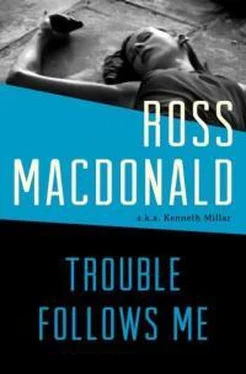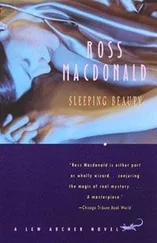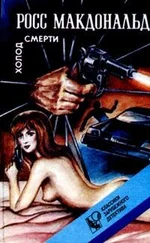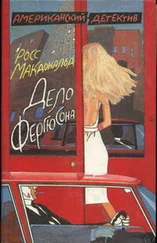It seemed useless to try to eliminate people I knew. There were so many other people on the train whom I didn’t know, and who might equally well have poisoned the bottle. Still, my mind had to take hold of something or it would tear itself to pieces like a motor with nothing to push.
Least likely first. The Tessingers. Rita was no suspect. She was a sweet kid only. A bobby-soxer in a bell-jar, waiting for somebody to lift the lid. Her mother, of course, was the lid. The old lady had some fire, especially since Teddy had been blowing on the coals. But the mind had to take a great leap to imagine her in a homicidal role. Mrs. Tessinger was something of a lady, a genteel woman if not a gentlewoman. She wouldn’t permit herself to get mixed up in spying and murder, if only because they weren’t respectable.
Major Wright. Sitting across the table from him and looking at his face was enough. He was rather pompous and self-important, probably because he had short legs. But he was a good man.
Teddy Trask. He was an elusive character. Probably capable of a good deal of trickery, on and off the stage. But he just didn’t seem built for murder. He had too much of a sense of humor, for one thing. For another, he had paid no attention at all to Private Hatcher. Besides, I liked Teddy.
Uriah with the short black hair. He puzzled me, and he made me angry. So far as I knew, he hadn’t said a word to anyone on the train. Yet he was constantly popping up. I had a feeling that he listened to everything that was going on, and wrote it all down in a little black book. I made a resolution to see that imaginary little black book. And I hoped I had to fight him for it.
Miss Green. There was a good deal of experience in her face, not all of it acquired at strawberry socials and Sunday School picnics. I had seen brokendown dancers and aging party girls with the same desperate devotion to cosmetic youth as she had, and the same knowing old eyes. She looked like a woman who refused to be kidded. I wouldn’t put crime past her, but it would have to pay. And it would have to be less risky than murder.
Mr. Anderson. A type which I had always disliked. My first impression was that he was a stupider and less interesting Babbitt. I still thought he was stupid, but he didn’t fit so neatly into the Babbitt pattern. A woman like Miss Green was apparently his meat. He had a bluff silly jovial air, but he seemed to understand situations. The things he said gradually seemed to get less stupid, though they never got past average. Perhaps the main thing which made me distrust him was an impression of power he gave. Yet his whole approach belied it. The last thing a Babbitt will let you imagine is that he has a will of his own. Still I felt there was a raw low-grade power in Anderson. That wasn’t much of a reason for suspecting him of murder, but I did.
Major Wright had excused himself and gone away, a little displeased by my lack of interest in his ideas. The diner was empty of passengers, and the headwaiter was looking at me inquiringly. Something about the car, probably the Negro waiters in their white coats, reminded me of Honolulu House and Mrs. Merriwell.
It occurred to me with an unpleasant shock that perhaps my prejudices limited my thinking as much as her prejudices limited hers. After all, there was plenty of reason for thinking that Hector Land had killed Sue Sholto and run away to escape the consequences. And there was a Negro porter in our Pullman, a Negro I knew nothing about. For all I knew, he could be a member of Black Israel.
I found the porter sitting by himself at the end of our car. He was reading a magazine with such close attention that for a moment he didn’t see me standing beside him. Then he looked up, closing the magazine on a black finger. It was the Atlantic Monthly.
Looking into his lined face, set in dignified reticence, I felt like a fool. I was about to question a man about a murder for the sole reason that he was black. Then something that Wanless had said to me came to my rescue. He had advised me to consult an intelligent Negro about Black Israel.
“Would you object to my asking you one or two questions?”
He stood up, leaving the magazine on the seat behind him. “No, suh. You can ask me any question. That’s one of the things I’m here for, to answer questions.”
“My question has nothing to do with your job, but it’s important to me. Is there anywhere we can go to talk?”
“We can go to the vestibule, suh. There’s nobody out there just now.”
He followed me out to the vestibule, where the spring wind swept in through the open halves of the doors.
“My name’s Drake,” I said, and held out my hand.
He regarded it with cautious impassivity, as if it were a gift which might explode in his face. Then he took it perfunctorily, withdrawing his hand quickly as if from a trap. “Pleased to meet you, Mr. Drake, suh. Mah name’s Edwards, suh.”
He held his speech carefully in the Amos ‘n’ Andy tradition, the slurred speech which whites have learned to expect of Negroes and resent the absence of.
I realized that I was getting nowhere fast. “Look, Mr. Edwards” – I made the Mister as casual as I could – “I used to work for a newspaper in Detroit, and I’ve always tried to help your race. You’ll have to take my word for that, but it’s true. A few days ago a woman I knew, a Negro woman, was killed in Detroit. I have reason to believe that an organization called Black Israel had something to do with her death. I haven’t been able to find out anything about Black Israel. Can you help me?”
“I don’t mess with things like that, Mr. Drake. Except for our Brotherhood, I keep myself to myself.”
“I went to Dr. Wanless at the University of Michigan. He advised me to consult an intelligent Negro.”
“Professor Wanless? I heard him speak at a meeting in Chicago. He was a fine speaker.” He had begun to use the plain Midwestern English which is natural to a Negro born in the Middle West and educated in the public schools. I felt that his resistance was lowering.
“I know that Black Israel is a Negro society. I suspect that it’s the kind of thing that intelligent Negroes disapprove of. Can you tell me anything about its purposes and methods?”
“Excuse me, Mr. Drake, but what use are you going to make of anything you find out?”
“I’ll tell you frankly I don’t know. I do know that the FBI is investigating Black Israel. If I find out anything that they haven’t already learned, I’ll turn the information over to them. You see, I discovered the body of the woman who was killed. The night before she died I heard her mention Black Israel, and I heard a man, another Negro, warn her to keep quiet. I got the impression from what she said that Black Israel was subversive.”
“So the FBI is after them,” the black man said. “It’s about time.”
“You have heard of Black Israel, then?”
“I’ve been approached. But I’ll tell you, Mr. Drake, I wouldn’t touch Black Israel with a ten-foot pole. It started out respectable enough but it went downhill fast. It’s my own opinion that somebody got into it who had an axe to grind. At one time I thought it was the Nazis. That was in forty and forty-one, when Black Israel started to go rotten.”
“The Nazis? What made you think that?”
“We had our own investigations, Mr. Drake. Investigations of certain – certain things which threatened to do harm to our cause. There was fascism behind some of the movements which claimed to speak for the Negro in America, – it was strong in Detroit. Our Brotherhood has always looked out for things like that.”
“But you said you no longer think that the Nazis are behind Black Israel. What made you change your opinion?”
Читать дальше







